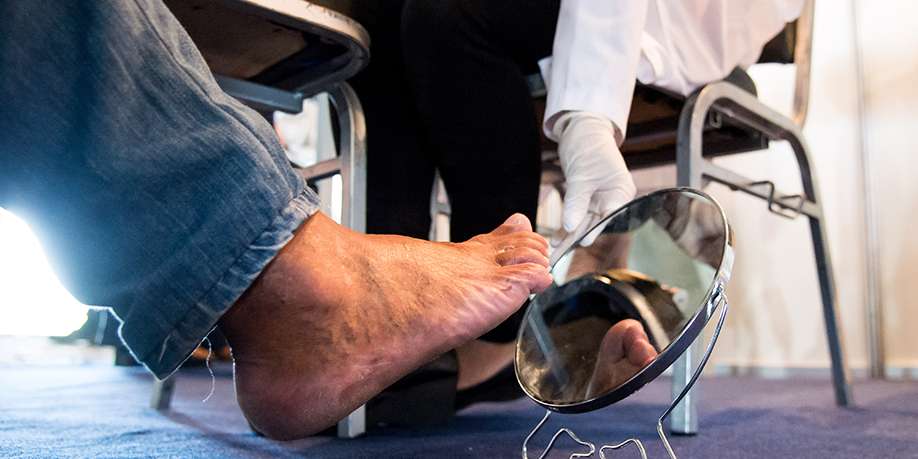
Diabetes Foot Care — Why People with Diabetes Need to See a Podiatrist RegularlyDiabetes Foot Care — Why People with Diabetes Need to See a Podiatrist Regularly
  © Celso Pupo Rodrigues | Dreamstime.com Everyone who has diabetes should have an annual foot check to prevent any serious problems resulting from having type I or type II diabetes. Diabetes is a systemic disease that affects different parts of the body, and as such, it may require different practitioners to treat or manage. Podiatrists play a vital role in managing foot health for people with diabetes and the prevention of amputations. Why is diabetes affecting your feet health? If you live with diabetes, you may experience foot complications due to the damage the disease is causing to the nerves in your feet and to blood circulation. Having diabetes increases the risk of developing foot problems that range from foot ulcers to amputations.
Diabetes is more likely to cause damage to your feet if:
What can you do to prevent diabetes related foot problems? If you have diabetes, you should have your feet checked by a podiatrist every year. This is the best way to detect problems early on and prevent any future complications. You can also take measures to prevent problems by doing the following on a regular basis:
There is also an extensive list of things to check regularly. If you see any of the following symptoms, it's essential to seek medical treatment right away.
What are some other symptoms to look for? Poor blood glucose control that is present in people with diabetes can reduce the supply of blood to the feet. As a result, people with diabetes are more prone to infections after sustaining an injury that breaks the skin. Some of the signs of blood supply problems that you should be on the lookout for include the following:
People with diabetes can also develop nerve damage to their feet because of poor blood glucose control. Some of the symptoms related to nerve damage that you should look out for include:
It's extremely important to pay close attention to these symptoms because they can lead to a loss of sensation in the feet. This increases the risk of damage because you won't be able to feel any pain. If you don't monitor these symptoms carefully, you may develop more severe complications, including chronic infections in the joints and bones that may eventually lead to the need for amputation.
Why is it important to go for routine check-ups? It's essential to see a podiatrist on a regular basis, even if your feet aren't bothering you at all. Podiatrists specialize in the treatment of feet conditions and diseases, and they are typically the first to notice any diabetes-related issues. In many cases, patients have limited mobility or nerve damage that doesn't allow them to see any developing issues on the bottoms of their feet. Your podiatrist will be able to assess your feet professionally and tell you how much you are at risk of developing a foot problem.
Your doctor will check for three risk levels that include:
Your podiatrist will explain to you what your level of risk means and will be able to provide you with guidance on what to do next. If you have diabetes, it is important to know how to look after your feet at home according to your level of risk. Make sure that you book an appointment with your podiatrist anytime you develop signs of issues on your feet so you can prevent possible complications.
| |||||||||||||||||||||||||




























